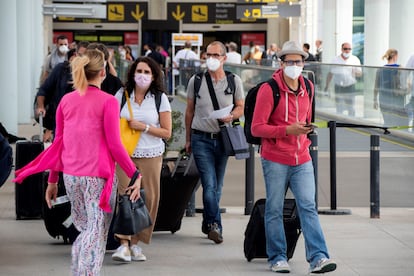Spain to welcome global travelers from next week, but they must have been vaccinated 14 days previously
The full details of the new measures are due to be published this weekend in the Official State Gazette (BOE) and will go into force from Monday

From Monday onward, passengers who have been vaccinated against Covid-19 will be able to enter Spain, no matter which part of the world they are traveling from. That was the announcement made by the prime minister, Pedro Sánchez, on May 21 at the Fitur tourism fair in Madrid. But the details of the measure are still yet to be released.
However, according to a range of government sources, among the conditions for entry into the country for travelers from outside the European Union will be the need to have been vaccinated 14 days before arrival, and to have received both doses of the vaccine in question in order to have full protection – or just the one necessary shot in the case of the Janssen medication.
The full order is due to be released on Saturday in the Official State Gazette (BOE), according to the same sources, and will enter into force on Monday as had been announced. The text is being prepared by the Health and Interior ministries, which are in charge of healthcare controls and the country’s borders. Late on Thursday, the document was still yet to be finalized.
Another of the questions that the order will cover is exactly which vaccinations will be accepted. The text is likely to include those approved by the European Medicines Agency (EMA) and the World Health Organization (WHO) – i.e. Pfizer-BioNTech, Moderna, Oxford-Astrazeneca and Janssen, as well as the Chinese vaccines Sinopharm and Sinovac-Coronavac.
The partial reopening of Spanish borders will be particularly significant for travelers from outside of Europe and the United States – for example, Latin American countries such as Mexico, Argentina and Colombia, among others. It will allow for leisure flights between markets where there are already strong links, and for the reunification of families who have not been able to travel without a justifiable reason.
The measure will also drive the recovery of long-distance flights, which have been cut back since the coronavirus pandemic took hold. These include connections with a range of Asian countries, where the aforementioned WHO-approved Chinese vaccines are being used – among them China, Thailand, the Philippines and India, among others.
Setback for UK visitors
Meanwhile, the United Kingdom on Thursday opted to keep all European Union countries, including Spain, on its amber list for travel. The British government will also take Portugal off its green list and add it to the amber one. The new list will go into effect in a week. The move represents a blow for the UK tourism industry, which had been hoping for more flexible rules. Despite hopes that Spain’s Canary and Balearic Islands might be placed on the green list, the UK authorities opted not to make that change for now. This means that visitors returning to the UK from Spain or other EU countries must take a PCR test before travel, quarantine for 10 days on arrival and take two home coronavirus tests. When UK nationals arrive in Spain, however, they do not have to present a coronavirus test nor have an essential reason for travel. The only exception to this, according to the gov.uk official advice, is that “travelers from the UK should be prepared to present evidence of a negative test if they have traveled to a country on Spain’s list of ‘risk countries’ in the 14 days prior to travel.”
English version by Simon Hunter.
Tu suscripción se está usando en otro dispositivo
¿Quieres añadir otro usuario a tu suscripción?
Si continúas leyendo en este dispositivo, no se podrá leer en el otro.
FlechaTu suscripción se está usando en otro dispositivo y solo puedes acceder a EL PAÍS desde un dispositivo a la vez.
Si quieres compartir tu cuenta, cambia tu suscripción a la modalidad Premium, así podrás añadir otro usuario. Cada uno accederá con su propia cuenta de email, lo que os permitirá personalizar vuestra experiencia en EL PAÍS.
¿Tienes una suscripción de empresa? Accede aquí para contratar más cuentas.
En el caso de no saber quién está usando tu cuenta, te recomendamos cambiar tu contraseña aquí.
Si decides continuar compartiendo tu cuenta, este mensaje se mostrará en tu dispositivo y en el de la otra persona que está usando tu cuenta de forma indefinida, afectando a tu experiencia de lectura. Puedes consultar aquí los términos y condiciones de la suscripción digital.








































